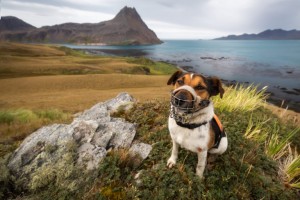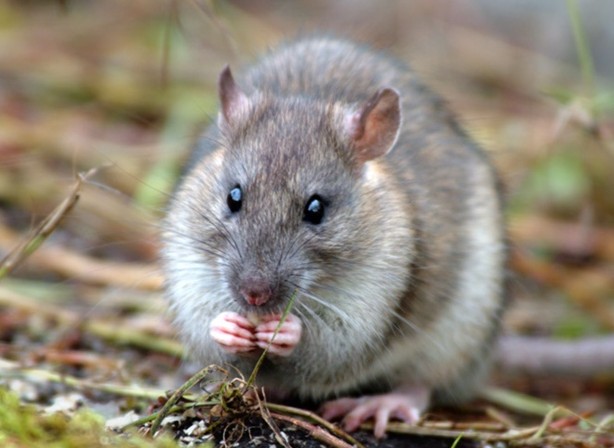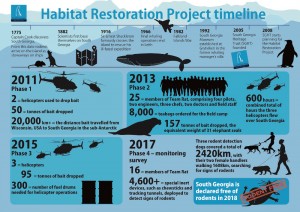- UK Overseas Territory of South Georgia is officially declared free of rats for the first time since humans arrived on the island over 200 years ago
- Scottish-based charity the South Georgia Heritage Trust and its USA counterpart the Friends of South Georgia Island raised £10 million to finance the Habitat Restoration Project to eradicate invasive rodents
- Covering 108,723 hectares (1087 km2), the Habitat Restoration Project is more than eight times larger than any other rodent eradication area ever tackled anywhere in the world
- Three rodent detection dogs covered a total of 2420km, with their two female dog handlers walking 1608km, searching for signs of rats and mice as part of a comprehensive monitoring survey
After 200 years of wreaking havoc on the local wildlife rats have at last been eradicated from the South Atlantic British island of South Georgia.
The biggest rat eradication programme was declared a success this week when a survey of the British Overseas Territory found no trace of the rodents that had been attacking the local birdlife. A nine-year £10m campaign of dropping poison pellets by helicopter around the island’s coastal areas has paid off.
The work was achieved by a small Dundee based charity the South Georgia Heritage Trust which was moved to restore the biodiversity heritage of the remote island.
Professor Mike Richardson, Chairman of the SGHT Habitat Restoration Project Steering Committee said: “South Georgia Heritage Trust is delighted to declare that its Habitat Restoration Project is complete and that invasive rodents have been successfully eradicated from the island. It has been a privilege to work on this conservation project, the largest of its kind anywhere.”
The TV series ‘Blue Planet’ recently highlighted environmental challenges raising awareness of South Georgia’s importance to seabirds and nature.
S Georgia was first visited by the great explorer James Cook in 1775. Invasive mice and rats would have arrived on South Georgia as stowaways on sealing and whaling vessels soon afterwards. They have preyed on ground-nesting and burrowing birds, particularly the various species of albatross; South Georgia has no trees and so the rodents have had a devastating effect on these bird colonies, which evolved in the absence of natural predators and were becoming increasingly confined to rodent-free small offshore islands. In particular, the rodents have threatened the existence of two endemic species found nowhere else on Earth: the South Georgia pipit and South Georgia pintail.
The islands are still visited by large numbers of people on wilflife cruises but while still impressive the wildlife had become a shadow of what Captain Cook encountered when he discovered and named the island.
The SGHT team has had to wait two years since it last put down rodent poison to verify its effect. This year three special sniffer dogs combed the island. In an incredible feat of endurance and teamwork reminiscent of Sir Ernest Shackleton’s epic crossing of S Georgia just over a hundred years ago, the two female handlers walked a total of 1608km, with the dogs covering a total of 2420km.

Rat detection dog Will (owned and trained by Miriam Ritchie) at work on the Rat Eradication Project at Corral Bay in South Georgia, on February 09 2018. Photo: Oliver Prince
Traps with peanut butter were also set, but no evidence was found.
Alison Neil, the chief executive of the Dundee-based SGHT, thanked the trust’s many financial donors, including the tourists who go to the island. “We get something like 9,000 of them a year on South Georgia. They all really contributed and we raised about £200,000 a season from the cruise ship passengers.”
The trust adds that an eradication on this scale (South Georgia is nearly 1100sqkm) would be very difficult to achieve – but for one factor. The sub-Antarctic island is covered by numerous glaciers and these effectively divided up the territory into convenient killing zones. With rodents unwilling to cross ice fields, the project team knew it could clear areas and have confidence they would not be re-infested from the places yet to be baited.
The hope is that now the birdlife can be re-established – although the density of plastics in the ocean is now a major factor in bird mortality as many feed on pieces of plastic as they forage for food.
And the hope is also that rats do not return or reappear in this largely unspoilt remote island.
Main image: Brown rat by Paula O Sullivan
Alison Neil interviews:
TV: http://www.sght.org/news/bbc-breakfast-south-georgia-declared-rodent-free/



